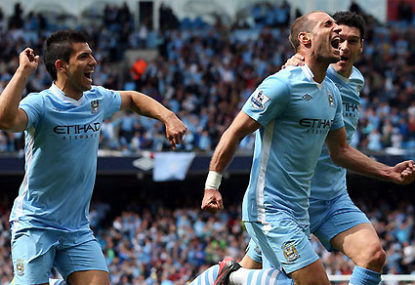bshine11
new author
Roar Rookie

The JFK assassination. The moon landing hoax. The diminishing portion sizes served at Oporto. Whatever it is, we all appreciate a good conspiracy theory.
While some may dismiss the following as ‘conspiracy-talk’, it is undeniable that there are some curious things going on behind the scenes in modern sport and in particular football.
What I am talking about is how large sums of dirty money are increasingly used as a vehicle to advance nefarious financial or political objectives through the guise of a football club.
Take one look at footballers’ wages and transfer fees and it is clear there is a lot of money in professional football.
This is partly down to the trend in recent years for football teams to be bought by rich oligarchs, who then invest huge amounts of money into these teams. Given this level of investment the teams are generally successful, but run at a huge financial loss. This also has an inflationary effect on the market for players, hence the huge wages.
Think Manchester City, who after being bought by Sheikh Mansour spent hundreds of millions acquiring some of the world’s best players (and paying them a motza) and as a result won the English Premier League in 2012, yet also recorded a yearly loss of £197m, the biggest in English football history.
There are commonly two attitudes towards this situation.
The first is acceptance, as in ‘Yeah, my team is winning and I don’t care if some rich oil baron lost a lot of money in the process’.
The second attitude is disgust, with the sentiment that this trend is ruining football – and its corollary, ‘I wish my team got bought by a rich oil baron and enjoyed this level of success’.
Both of these reactions avoid the critical point: why is some outrageously wealthy individual prepared to foot such massive losses in order to see his team win trophies?
Make no mistake, this is not about some diehard fan throwing his money away so he can see his boyhood club achieve their dreams. British journalist Matthew Syed, who recently appeared on Sky Sports News to discuss the 10th anniversary of Roman Abramovich’s purchase of the Chelsea Football Club, shed some light on the motivations behind the billionaire’s investment.
As is well documented, before purchasing Chelsea, Mr Abramovich made his wealth through a series of dodgy privatisation deals with the former Yeltsin Government in Russia. Some people in Russia, including the Putin Government, resent this.
By associating with a highly-visible British institution like Chelsea Football Club, Mr Abramovich has bought security and insulated himself from political retribution or any attempts by the Russian Government to reclaim their money.
The take-home is that massive football clubs are not bought for business reasons. They are bought by rich people for political reasons, and often with dirty money.
But what does all this matter if you can still turn your TV on to watch Wayne Rooney launch a 40-yard through ball for Robin van Persie to dispatch a volley into the top corner?
It matters because sport needs integrity.
Sport is enduring because it’s pure. In a hectic world governed by blurred rules and no simple answers to life’s most vexing questions, sport gives us something simple to appreciate. Two teams. A rigorously enforced set of rules. A final outcome.
When you start messing with that fabric by corrupting the rules and distorting the parameters of the game, then you ruin something beautiful.
So instead of sitting back and trying to enjoy our sport on face value, maybe we should think a little harder about what goes on behind the scenes.
Just like hyper-conscious inner-city hipsters asking if their $300 distressed wool pashmina was made in a factory that uses slave labour or if the coffee beans in their $4.50 large piccolo latte is free-trade, perhaps it’s time we starting asking where the money behind our football teams come from and what effect it has on the game?
Maybe it’s too hard to uncover the nefarious motives driving this huge financial investment in professional sport. Maybe the entrenched interests are too strong to be broken down.
More likely is that we can’t be stuffed confronting the painful truth. There’s probably just no audience for these types of stories. The viewing public just want to watch sport and not think about bigger issues.
Don’t bother us with the harsh realities. Let us get back to enjoying our delicious bread and delightful circuses.